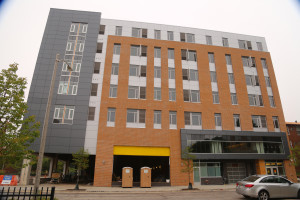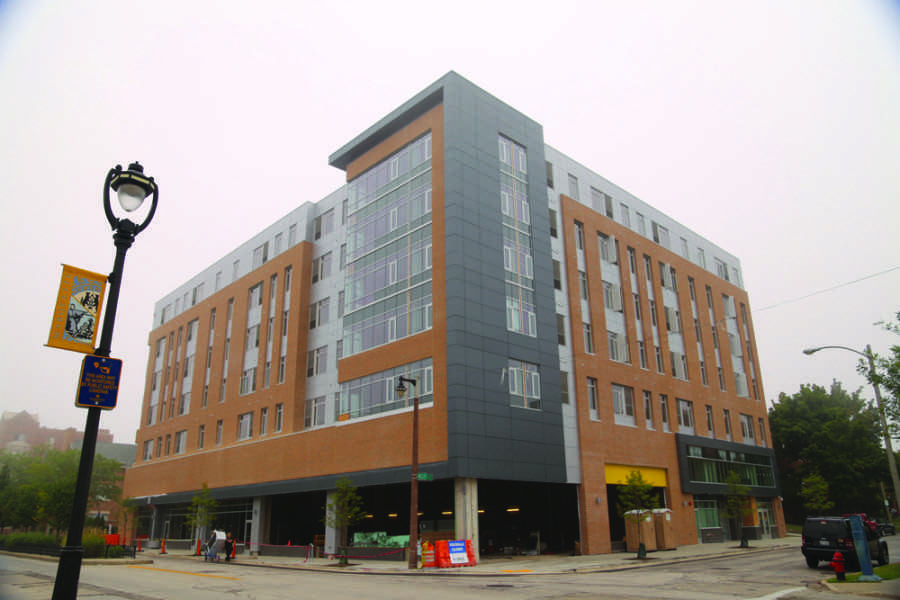 Every morning on my way to class, I walk past Ivy on Fourteenth, the new student apartment complex on the northwest corner of 14th and Wells. From the moment it comes into my periphery until I arrive at class, I cannot stop thinking about it. I find myself admiring the silvery panels reflecting the sunlight and wondering what it is like to live there. After all, Ivy on Fourteenth bills itself as “Luxury Student Living”; its units come with granite countertops and flat screen TVs, and the amenities include a state-of-the-art gym and a daily coffee bar. I’m slightly envious of the lucky souls who have access to this daily coffee bar, and as a former resident of the 2040 Lofts, I admit I am starting to miss having a gym right below my apartment.
Every morning on my way to class, I walk past Ivy on Fourteenth, the new student apartment complex on the northwest corner of 14th and Wells. From the moment it comes into my periphery until I arrive at class, I cannot stop thinking about it. I find myself admiring the silvery panels reflecting the sunlight and wondering what it is like to live there. After all, Ivy on Fourteenth bills itself as “Luxury Student Living”; its units come with granite countertops and flat screen TVs, and the amenities include a state-of-the-art gym and a daily coffee bar. I’m slightly envious of the lucky souls who have access to this daily coffee bar, and as a former resident of the 2040 Lofts, I admit I am starting to miss having a gym right below my apartment.
But recently, another set of thoughts has surfaced. While I lived in the 2040s, and as I watched the Ivy go skyward, I could not help feeling a little guilty being surrounded by such comforts, especially knowing that poverty continues to be such a pressing issue in Milwaukee. As a student at a school that emphasizes service and the care of others, was living in a luxury apartment contradictory to Marquette’s mission?
To find my answers and better understand Marquette’s overall mission, I went back to the teachings of Ignatius of Loyola, the original Jesuit himself, as well as one of his saintly counterparts, Francis of Assisi. Both believed material possessions should play a minor role in the lives of the faithful. Francis and his followers subscribed to the ideals of both simplicity and poverty—that is, that one’s possessions should be unostentatious and next to nothing. Several centuries later, Ignatius originally strove to live the same ascetic lifestyle that Francis had. His views, however, would change. Today, one of the main Ignatian ideals is that of indifference; what matters is not how many or few possessions we have, but what role they play in our lives.
While Franciscan ideals of austerity would clash with the comforts of a place like the Ivy or the 2040s, Ignatian ideals are much more adaptable. If we are fortunate enough to have the means to live comfortably, we are not forced to renounce our possessions and live in poverty. Likewise, if we live in simplicity, we are asked not to yearn for what we do not have and to accept what we have been given. Ignatian ideals simply ask that, no matter where we live or what we have, we remember to be good people and that we look out for one another.

As we all make plans for our future housing arrangements, whether we are in a roomy luxury suite or in a tiny vintage efficiency, we can keep these Ignatian ideals in mind. For me, that means changing the way I look at the Ivy each morning. I will probably still admire the building’s sunny glint each morning, and that is OK. But to truly live up to Ignatian ideals, it is time for me to stop yearning wistfully for an in-building coffee bar. The important thing is to focus instead on what I can do with what I have—which, yes, means learning to accept that my fridge will remain in my new living room. C’est la vie.




